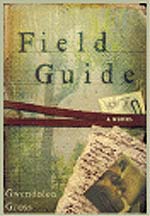 |
| Bookshelf |
Please
send news of your recently published book along with
a review copy, if possible, to "Bookshelf," Oberlin
Alumni Magazine.
Your review copy will be presented to the Oberlin College
Library as a gift from you.
|
 Field
Guide Field
Guide By
Gwendolen Gross '89
Henry
Holt, 2001
Reviewed
by Joanna Smith Rakoff '94
Annabel
Mendelssohn, the eccentric heroine of this mystery/adventure
novel, wrestles with the unknowable. A scientist by trade,
she's trying to understand the circumstances of her brother
Robert's death by drowning--was it an accident or suicide?--as
well as her own complicated and conflicted feelings about
him which still govern her existence nearly two years after
his death. "Robert," she thinks to herself at one point, "never
really told me what he felt; I drew belief from the clues
of his face, from what he said and what he didn't."
To
come to terms with her fears that she possesses both Robert's
genius and his madness, Annabel, at 28, leaves her Chicago
lab job for a remote corner of Australia to begin "what her
brother had called the real work: the field, putting her hands
on life." Enrolled in a field studies MA program, Annabel
becomes frustrated with dull classes; group projects; and
students and professors who flirt, gossip, and break off into
cliques. Her deliciously horrible roommate Sabrina, "a monster
of vanity" who litters their room with "hair sprays and toxic-waste
face paint," particularly upsets Annabel, playing on her insecurities
about her looks and charm and her fears that she's boring
and forgettable. Annabel is understandably eager to begin
her solo work in the jungle: a study of spectacled fruit bats.
Against
her better judgment, she develops a crush on Professor John
Goode, in no small part because his genius and recklessness
remind her of Robert. Separated from his wife, Goode is filled
with remorse, self-loathing, and a sense of his failure as
a husband and father. His 20-something son Leon, disillusioned
with hard science, has dropped out of his Harvard doctoral
program and found work at the Boston Museum of Science.
When
Professor Goode disappears into the bush without a trace,
Leon flies home to Australia to search for him. The journey
eventually takes him to Annabel, now living alone in the rainforest
monitoring her beloved bats. She leaves her fieldwork to accompany
him, and, at first, the two cranky, headstrong researchers
grate on each other's nerves, but as they travel through the
parched countryside, they fall deeply in love.
Field
Guide hums with a psychological intensity, leavened with
lively and often acerbic wit that propels the narrative along,
making this a satisfying, pleasurable, and thought-provoking
novel. Even the most minor characters are constructed in complicated
emotional terms. It is Annabel, however, who carries the book
with her eccentricities, frustrations, and heightened self-awareness.
She's a stunning, difficult character--a grown-up, 21st-century
Anne of Green Gables. She's honest, lovable, and sometimes
annoying, but always compelling.
The
author, Gwendolyn Gross, earned an MFA from Sarah Lawrence
College and lives in Ridgewood, New Jersey, with her husband,
Joshua Rosenburg '89, and their 2-year-old son, Jacob. This
is her first novel.
Joanna
Smith Rakoff is a published poet and writer in New York City.
She is the books editor of Shout magazine and a book
reviewer for the San Francisco Chronicle and Kirkus
Reviews.
go
to page 1 | 2 | 3
| 4 of Bookshelf
|

